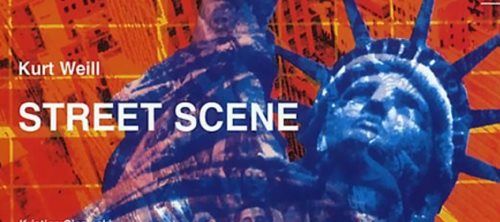
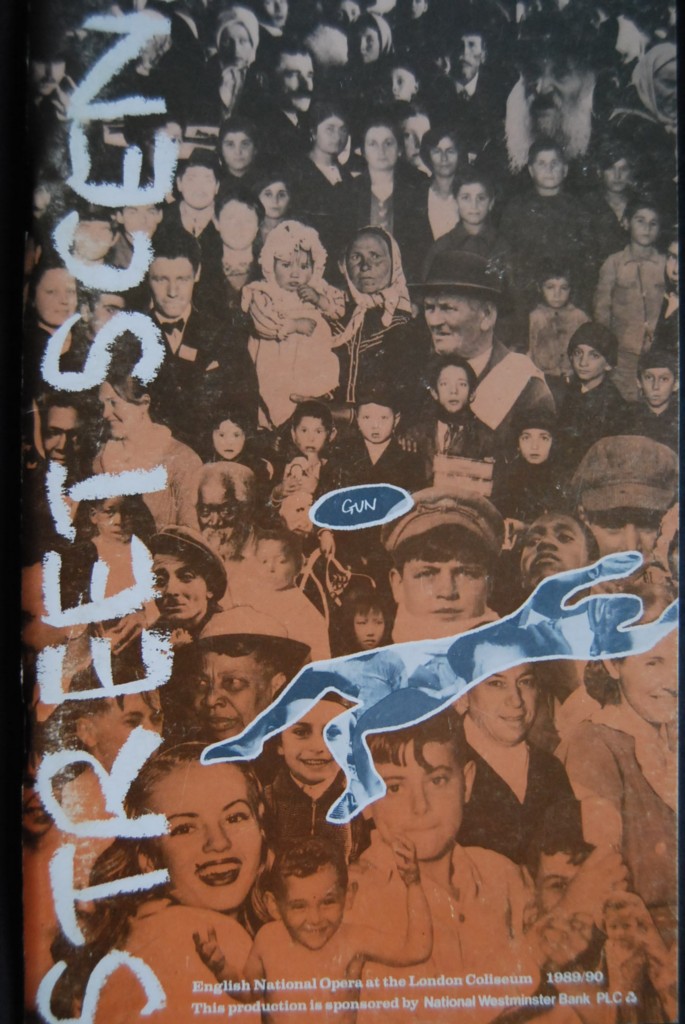
Version 2
Street Scene (1989-10-Coliseum Theatre-London)
Type de série: Original LondonThéâtre: Coliseum Theatre (Londres - Angleterre) Durée : Nombre : Première Preview : jeudi 12 octobre 1989Première : jeudi 12 octobre 1989Dernière : InconnuMise en scène : David Pountney • Chorégraphie : Producteur : Avec : Abraham Kaplan ... Terry Jenkins / Greta Fiorentino ... Susan Bullock / Salvation Army Girl ... Marian Martin / ... Melodie Waddingham / Carl Olsen ... Arwel Huw Morgan / Emma Jones ... Meriel Dickinson / Olga Olsen ... Angela Hickey / Shirley Kaplan ... Blythe Duff / Henry Davis ... Neil Patterson / Willie Maurrant ... Daniel Ison
Street Scene is a story of love, passion, greed and death on a New York City street. The show concerns life in a tenement house between one evening and the next afternoon. The show focuses primarily on the Maurrant family. Frank Maurrant, a Broadway stagehand, is an abusive drunk. His wife, Anna, is having an affair with Mr. Sankey. Their daughter, Rose, is caught in the middle of her feuding parents and struggles with her own problems. When Frank catches Anna having an affair, he shoots her dead. Nevertheless, after the carnage is cleared up, life goes on as normal on the New York street.
En 1947, Kurt Weill présente Street Scene, son ouvrage le plus lyrique, gratifié du premier Tony Award de l’histoire de Broadway. Dès la lecture de la pièce à succès d’Elmer Rice, prix Pulitzer 1929, il comprend qu’il tient « le sujet parfait pour un opéra américain, par son récit prenant et la richesse de ses protagonistes ». L’histoire de cette rue de New York lors d’une journée de canicule, avec ses personnages hauts en couleur, entre au répertoire du New York City Opera en 1959, neuf ans après la mort de Kurt Weill, réalisant ainsi le rêve du compositeur d’origine allemande : écrire un opéra américain.
Immigré aux États-Unis en 1935, Kurt Weill tentera de donner à Broadway un ton plus « opéra ». Entre 1936 et 1949 il compose huit partitions pour le fameux quartier des théâtres. Ainsi, avec ses comédies musicales sophistiquées, il est l’un des précurseurs du concept musical, cher à Stephen Sondheim, basé sur la psychologie des personnages.
In Germany, in the late 1920s and early 1930s, Weill had already begun to use American jazz and popular song elements in his operas. After fleeing from Germany in 1933, he worked in Paris, then England, and then, beginning in 1935, in New York. Weill made a study of American popular and stage music and worked to further adapt his music to new American styles in his writing for Broadway, film and radio. He strove to find a new way of creating an American opera that would be both commercially and artistically successful.[2] Weill wrote:
"It's my opinion that we can and will develop a musical-dramatic form in this country (America) but I don't think it will be called 'opera', or that it will grow out of the opera which has become a thing separate from the commercial theater, dependent upon other means than box-office appeal for its continuance. It will develop from and remain a part of the American theater – 'Broadway' theater, if you like. More than anything else, I want to be a part in that development."[3]
Weill sought to create musical theatre that would "integrate drama and music, spoken word, song, and movement."[4] He further wrote:
"This form of theater has its special attraction for the composer, because it allows him to use a great variety of musical idioms, to write music that is both serious and light, operatic and popular, emotional and sophisticated, orchestral and vocal. Each show of this type has to create its own style, its own texture, its own relationship between words and music, because music becomes a truly integral part of the play – it helps deepen the emotions and clarify the structure.[5]
Weill saw Rice's naturalistic play in 1930 and wanted to adapt it. As he wrote:
"It was a simple story of everyday life in a big city, a story of love and passion and greed and death. I saw great musical possibilities in its theatrical device – life in a tenement house between one evening and the next afternoon. And it seemed like a great challenge to me to find the inherent poetry in these people and to blend my music with the stark realism of the play."[6]
In 1936, Weill met Rice in New York and suggested the adaptation, but Rice turned him down. After the successes of Weill's Knickerbocker Holiday in 1938, Lady in the Dark in 1940, and One Touch of Venus in 1943 (and after Weill had composed incidental music for Rice's Two on an Island in 1939), Weill asked again, and Rice agreed. The two chose Harlem Renaissance poet Langston Hughes to, as Weill put it, "lift the everyday language of the people into a simple, unsophisticated poetry."
In order to enhance the realism of the new work, the collaborators utilized dialogue scenes, sometimes underscored by music. To create music that would portray the ethnic melting pot of characters described in Rice's book, Weill travelled to neighborhoods in New York, watching children at play and observing New Yorkers. Hughes took Weill to Harlem nightclubs to hear the newest musical idioms of black American jazz and blues. Hughes wrote, "The resulting song was composed in a national American Negro idiom; but a German, or someone else, could sing it without sounding strange or out of place." Weill and many critics have considered the score to be his masterpiece.
After a tryout in Philadelphia, revisions were made, and Street Scene opened on Broadway at the Adelphi Theater on January 9, 1947. It closed on May 17, 1947, after 148 performances, experiencing high running costs. The production was directed by Charles Friedman, with choreography by Anna Sokolow, and produced by Dwight Deere Wiman and The Playwrights' Company (Maxwell Anderson; S.N. Behrman; Elmer Rice; Robert E. Sherwood; Sidney Howard). Scenic and lighting design were by Jo Mielziner; costume design was by Lucinda Ballard. The production starred Anne Jeffreys as Rose Maurrant, Polyna Stoska as Anna Maurrant, Norman Cordon as Frank Maurrant, Brian Sullivan as Sam Kaplan, Hope Emerson as Emma Jones, Sheila Bond as Mae Jones, and Danny Daniels as Dick McGann. Juanita Hall was a notable replacement. Weill received the first Tony Award for Best Original Score, and Ballard received the 1947 Tony Award for Best Costume Design, competing with other strong musicals that year, notably Finian's Rainbow by Burton Lane and Brigadoon by Frederick Loewe.
A production by the English National Opera at the London Coliseum Theatre in 1989 included Catherine Zeta-Jones as Mae Jones.
The Opera Group, Young Vic, and Watford Palace Theatre gave the first UK production in 20 years in July 2008, winning the Evening Standard Award 2008 for Best Musical. Another production was performed in the grounds of the Old Royal Naval College in Greenwich on 19 July 2008, with the cast largely drawn from students from Trinity College of Music. In 2011 Street Scene was performed by the Opera/Music Theatre Workshop of Southeastern Louisiana University and, in German, by the Bayerische Theaterakademie August Everding and the Munich Radio Orchestra, led by Ulf Schirmer.
The Opera Group presents the first performance in Austria in October 2011, and the Semper Oper in Dresden produced the work to great acclaim earlier in 2011. The first performance in Spain will be in March 2013, at the Gran Teatre del Liceu.
Act 1
"Ain't It Awful, The Heat?" - Greta Fiorentino, Emma Jones, Olga and Carl Olsen, Abraham Kaplan
"I Got A Marble And A Star" - Henry Davis
"Get A Load Of That" - Emma Jones, Greta Fiorentino, Olga Olsen
"When A Woman Has A Baby" - Daniel Buchanan, Greta Fiorentino, Emma Jones, Anna Maurrant
"She Shouldn't Be Staying Out Nights" - Frank and Anna Maurrant, Greta Fiorentino
"Somehow I Never Could Believe" - Anna Maurrant
"Whatcha Think Of That?" - Emma and George Jones, Carl Olsen, Greta Fiorentino
"Ice Cream Sextet" - Lippo and Greta Fiorentino, Carl and Olga Olsen, George Jones, Henry Davis
"Let Things Be Like They Always Was" - Frank Maurrant
"Wrapped In A Ribbon And Tied In A Bow" - Jennie Hildebrand, Ensemble
"Lonely House" - Sam Kaplan
"Wouldn't You Like To Be On Broadway?" - Harry Easter
"What Good Would The Moon Be?" - Rose Maurrant
"Moon-faced, Starry-eyed" - Dick McGann, Mae Jones
"Remember That I Care" - Sam Kaplan, Rose Maurrant
"I Got A Marble And A Star (Reprise)" - Henry Davis
Act 2
"Catch Me If You Can" - Charlie and Mary Hildebrand, Willie Maurrant, Grace Davis, Children
"There'll Be Trouble" - Frank, Rose and Anna Maurrant
"A Boy Like You" - Anna Maurrant
"We'll Go Away Together" - Rose Maurrant, Sam Kaplan
"The Woman Who Lived Up There" - Ensemble
"Lullaby" - Nursemaid #1, Nursemaid #2
"I Loved Her, Too" - Frank and Rose Maurrant, Ensemble
"Don't Forget The Lilac Bush" - Sam Kaplan, Rose Maurrant
"Ain't It Awful, The Heat? (Reprise)" - Greta Fiorentino, Emma Jones, Olga Olsen, Abraham Kaplan
Aucun dossier informatif complémentaire concernant Street Scene
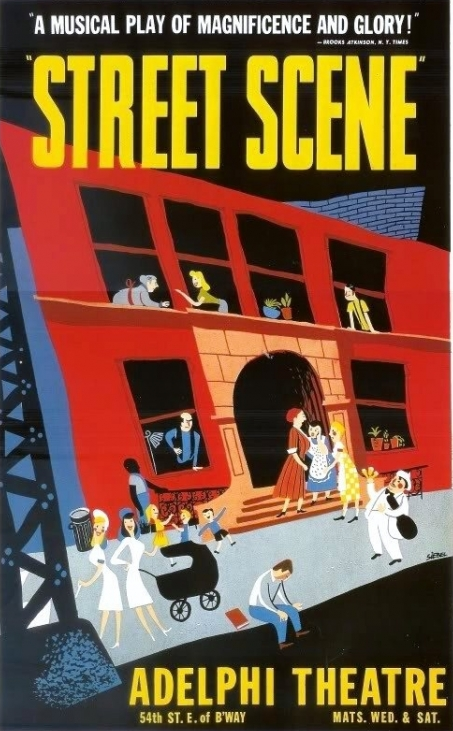
Version 1
Street Scene (1947-01-Adelphi Theatre-Broadway)
Type de série: OriginalThéâtre: George Abbott Theatre (Broadway - Etats-Unis) Durée : 4 mois 1 semaine Nombre : 148 représentationsPremière Preview : jeudi 09 janvier 1947Première : jeudi 09 janvier 1947Dernière : dimanche 17 août 1947Mise en scène : Charles Friedman • Chorégraphie : Anna Sokolow • Producteur : Avec : Greta Fiorentino ... Helen Arden / Emma Jones ... Hope Emerson / Olga Olsen ... Ellen Repp / Anna Maurrant ... Polyna Stoska / Sam Kaplan ... Brian Sullivan / Daniel Buchanan ... Remo Lota / Frank Maurrant ... Norman Cordon / Lippo Fiorentino ... Sydney Rayner / Rose Maurrant ... Anne Jeffreys / Mae Jones ... Sheila Bond

Version 2
Street Scene (1989-10-Coliseum Theatre-London)
Type de série: Original LondonThéâtre: Coliseum Theatre (Londres - Angleterre) Durée : Nombre : Première Preview : jeudi 12 octobre 1989Première : jeudi 12 octobre 1989Dernière : InconnuMise en scène : David Pountney • Chorégraphie : Producteur : Avec : Abraham Kaplan ... Terry Jenkins / Greta Fiorentino ... Susan Bullock / Salvation Army Girl ... Marian Martin / ... Melodie Waddingham / Carl Olsen ... Arwel Huw Morgan / Emma Jones ... Meriel Dickinson / Olga Olsen ... Angela Hickey / Shirley Kaplan ... Blythe Duff / Henry Davis ... Neil Patterson / Willie Maurrant ... Daniel Ison
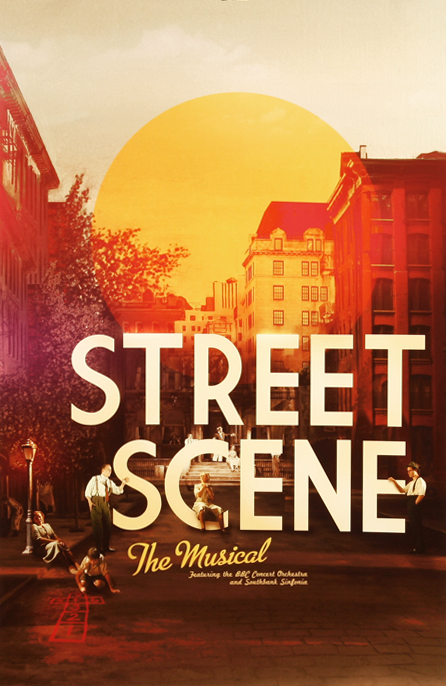
Version 3
Street Scene (2008-07-Young Vic-London)
Type de série: RevivalThéâtre: Young Vic Theatre (Londres - Angleterre) Salle : Main StageDurée : Nombre : Première Preview : jeudi 17 juillet 2008Première : jeudi 17 juillet 2008Dernière : mardi 22 juillet 2008Mise en scène : Dave Fulljames • Chorégraphie : Arthur Pita • Producteur : Avec : Cast: Elena Ferrari (Anna), Andrew Slater (Frank), Ruby Hughes (Rose), Simon Lobelson (Harry Easter), Adrian Dwyer (Sam Kaplan),
Charlotte Page (Emma Jones), Harriet Williams (Mrs Olsen), Kate Nelson (Mae), John Moabi (Dick McGann). (The 16 strong cast did considerable doubling)Commentaires : This first revival was greeted more enthusiastically than the ENO production - possibly the passing of twenty years and the development of more serious and challenging musicals in the intervening period made it easier to accept that Kurt Weill was writing ahead of his time.
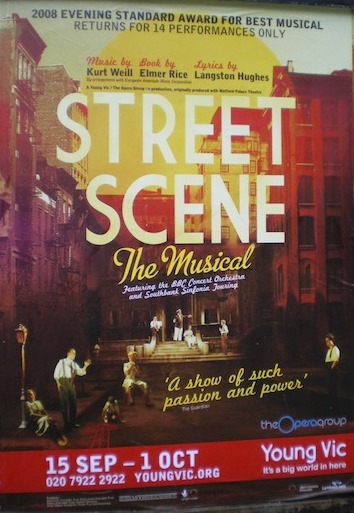
Version 4
Street Scene (2011-09-Young Vic-London)
Type de série: RevivalThéâtre: Young Vic Theatre (Londres - Angleterre) Salle : Main StageDurée : 1 semaine Nombre : Première Preview : jeudi 15 septembre 2011Première : mardi 20 septembre 2011Dernière : samedi 01 octobre 2011Mise en scène : Dave Fulljames • Chorégraphie : Arthur Pita • Producteur : Avec : Elena Ferrari (Anna), Geoffrey Dolton (Frank), Susanna Hurrell (Rose), James McOran-Campbell (Harry Easter), Paul Curievici (Sam Kaplan), Charlotte Page (Emma Jones), Harriet Williams (Mrs Olsen), Kate Nelson (Mae), John Moabi (Dick McGann). (The 20-strong cast did considerable doubling)Commentaires : This was a revival of th Young Vic’s 2008 production, enlarged as a community venture with a small army of child performers, a large amateur chorus and the BBC Concert Orchestra. Several of the original cast re-created their roles in
this revival. For the subsequent tour the orchestra was replaced with the Southbank Sinfonia Touring.Presse : ‘An extraordinary musical.'
Evening Standard
‘A show of such passion and power… a show that deserves to be seen.'
The Guardian
'If you want to see a theatre at maximum throttle, head to the Young Vic.'
The Daily Telegraph
Pas encore de video disponible pour ce spectacle

.png)
.png)




